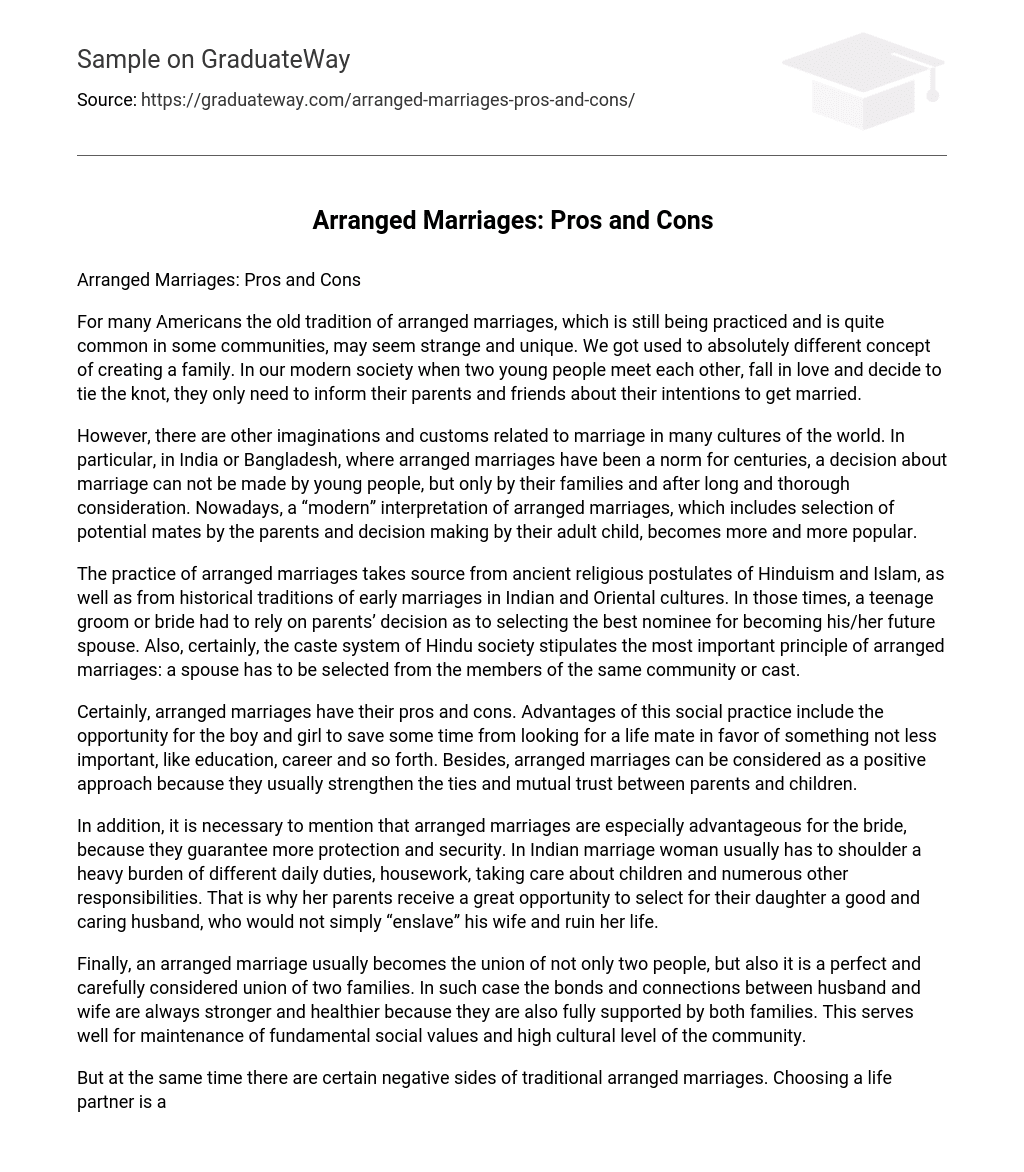For many Americans the old tradition of arranged marriages, which is still being practiced and is quite common in some communities, may seem strange and unique. We got used to absolutely different concept of creating a family. In our modern society when two young people meet each other, fall in love and decide to tie the knot, they only need to inform their parents and friends about their intentions to get married.
However, there are other imaginations and customs related to marriage in many cultures of the world. In particular, in India or Bangladesh, where arranged marriages have been a norm for centuries, a decision about marriage can not be made by young people, but only by their families and after long and thorough consideration. Nowadays, a “modern” interpretation of arranged marriages, which includes selection of potential mates by the parents and decision making by their adult child, becomes more and more popular.
The practice of arranged marriages takes source from ancient religious postulates of Hinduism and Islam, as well as from historical traditions of early marriages in Indian and Oriental cultures. In those times, a teenage groom or bride had to rely on parents’ decision as to selecting the best nominee for becoming his/her future spouse. Also, certainly, the caste system of Hindu society stipulates the most important principle of arranged marriages: a spouse has to be selected from the members of the same community or cast.
Certainly, arranged marriages have their pros and cons. Advantages of this social practice include the opportunity for the boy and girl to save some time from looking for a life mate in favor of something not less important, like education, career and so forth. Besides, arranged marriages can be considered as a positive approach because they usually strengthen the ties and mutual trust between parents and children.
In addition, it is necessary to mention that arranged marriages are especially advantageous for the bride, because they guarantee more protection and security. In Indian marriage woman usually has to shoulder a heavy burden of different daily duties, housework, taking care about children and numerous other responsibilities. That is why her parents receive a great opportunity to select for their daughter a good and caring husband, who would not simply “enslave” his wife and ruin her life.
Finally, an arranged marriage usually becomes the union of not only two people, but also it is a perfect and carefully considered union of two families. In such case the bonds and connections between husband and wife are always stronger and healthier because they are also fully supported by both families. This serves well for maintenance of fundamental social values and high cultural level of the community.
But at the same time there are certain negative sides of traditional arranged marriages. Choosing a life partner is a very difficult mission which has to be based not only on financial or social thoughts, but also on such factors as love, passion, physical attraction and so on. Only in such case marriage will be successful, long-lasting and enjoyable for both partners. Unfortunately, this idea is not always taken into consideration when selecting a spouse.
Therefore, arranged marriages are likely to be connected with some certain risk to spend own life with someone who will never become a truly close and understanding person. Besides, arranged marriages encourage dependence of children on their parents, and it is one of the most destructive disadvantages. In addition, such traditions as arranged marriages stimulate the system of casts which limits personal rights of people to a certain extent.
The tradition of arrange marriages may seem to be quite odd and rigid for many of us. Nevertheless, currently only about 4% of arranged marriages in India end up with divorce (Sharma). Traditional high-esteem of family values and belief in sanctity of marriage in Indian and Oriental cultures, responsibility and care about each other often originate a real love and mutual respect between the spouses, even after the final commitment. Therefore, such marriages really work in certain social environment.
References
Arranged Marriage. (2006, January 15). Article World. ArticleWorld Pte. LTD Retrieved November 25, 2007, from: <http://www.articleworld.org/index.php/Arranged_marriage >.
Love vs. Arranged. (n.d.). I Love India. Online India Guide. Retrieved November 25, 2007, from <http://weddings.iloveindia.com/features/love-and-arranged-marriages.html >.
Sharma, K. (2002). “Arranged Marriages in India.” Cyber Port Asia. Asia Pacific Foundation of Canada. Retrieved November 25, 2007, from: <http://www.cyberport.uqam.ca/english/countries/india/CultWinter2000Marriages.htm>.





